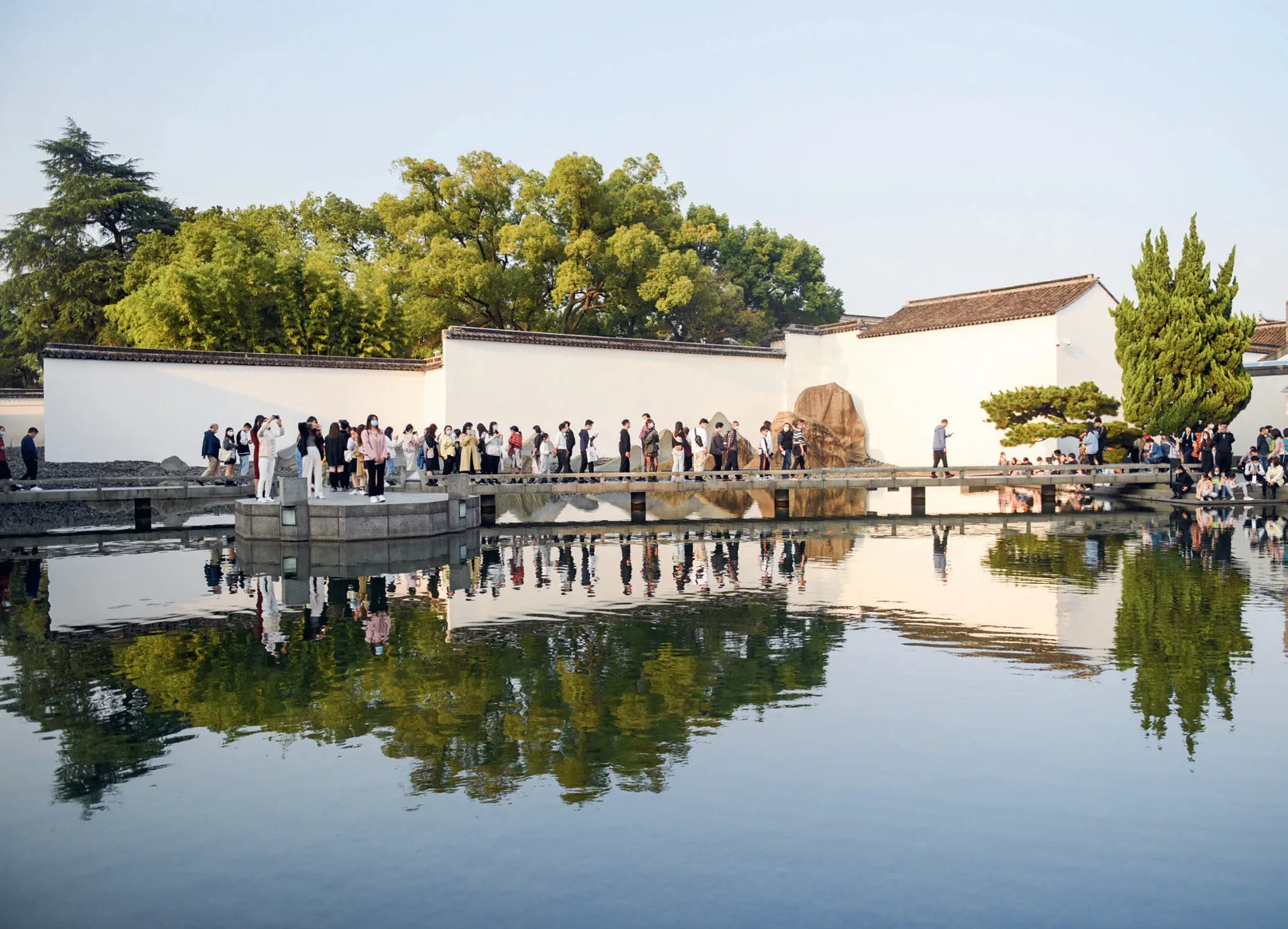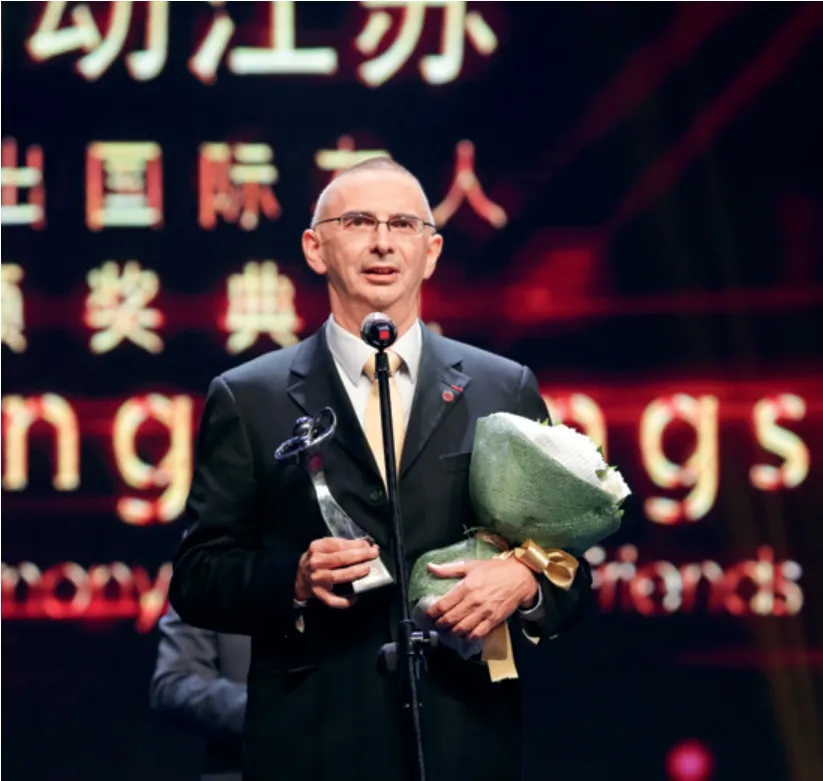Promoting Dialogue Between Cultures
By staff reporter LIU TING
A French expert explores the depth of Chinese culture and history, with a strong wish to promote a real dialogue between Eastern and Western cultures.

Visitors are enjoying the sight of classical Chinese garden architectural designs at the Suzhou Museum on October 30, 2021.
JEAN-FRANÇOIS Vergnaud, director of the Franco-Chinese Institute (IFC) at Renmin University of China in the city of Suzhou in east China, has worn many hats. He has been a construction worker, a legal advisor, a computer specialist, and a diplomat. He worked as a Chinese language teacher and later a researcher in Chinese studies. The 70-year-old’s China story began in 1974 with an unusual teacher.
An Extraordinary Mentor
While he was studying at the University of Nice, Vergnaud met Wang Lengqiao, a retiree living in Nice after a long career at the press service of the League of Nations in Geneva. “Mr. Wang was the first Chinese I ever met,” he said. “I don’t know why but I was fascinated and wanted to learn Chinese.”
Wang began to teach him, and his teaching methods were entirely different from those in French universities. “He pulled out old, yellowed copies ofThe Four Books[ancient Confucian texts that had to be studied for the civil service examination in China in the past] and said this was where we should get started… It was never about studying excerpts, we would read these texts from beginning to end.”
Learning Chinese under such a mentor was not easy but thanks to the unique approach, Vergnaud acquired a solid knowledge of both the Chinese language and culture and at the same time developed a new world vision. “The study of ancient Chinese texts opened my mind and broadened my understanding of the world. The apprenticeship opened me up to others, without ever making me think that my ideas could be superior to theirs.” Wang was not only his language teacher but also his guide through the maze of China’s culture, civilization, and values. “He never lectured me on civilization. The authors I studied conveyed their values between the lines.”
Vergnaud first came to China as a doctoral student in Chinese studies in 1981. At that time, foreigners were a rarity in China and he was warmly welcomed. Once, after a meal in a restaurant, he found someone had already picked up the tab.
During his first visit to Suzhou, he was drawn to the historical city that is considered the Mecca of classical Chinese literature. Often called “paradise on earth,” Suzhou is renowned for its diversity – of products, people, and sceneries. Vergnaud thinks that anyone who wants to learn what a typical Chinese lifestyle is like, Suzhou is the best place to visit.
Boosting Academic Exchanges
After he returned to France, Vergnaud taught Chinese language and civilization at the Paul-Valéry Montpellier 3 University for nearly 30 years, establishing a thriving Chinese department there. In 2007, he was invited by the French Ministry for Europe and Foreign Affairs to work at the French Embassy in Beijing, responsible for Sino-French academic cooperation. “I immediately took up the offer because it would allow me to develop broader academic exchanges between the two countries,” he said.
When he returned to China to work in Beijing, he was amazed how the country had changed while he was away. In the 1980s, he would take the night train to travel from one city to another. Today, with the high-speed trains, people can travel up and down the country faster and far more comfortably. “Who could have imagined a few years ago that almost no one would use banknotes or coins on a daily basis!” he marveled. “Twenty years ago, telephones were still a rarity, but today no one can imagine life without a mobile phone. Since the 1980s, and more since the mid 2000s, China has developed so quickly and to such an extent!”

Jean-François Vergnaud receives the Touching Jiangsu Award for Foreign Friends in December 2014.
Though Vergnaud worked on several cooperation projects at the embassy, he missed on-the-ground action. So in 2010, at the end of the three-year stint, he accepted an invitation by the Renmin University of China to set up the IFC.
The IFC offers courses in humanities and social sciences in partnership with Paul-Valéry Montpellier 3, Sorbonne University, and the KEDGE Business School in Marseille. The students take languages classes and learn about French society and culture. According to Vergnaud, they acquire valuable intercultural experience through a multicultural and multilingual environment. “They nurture a better understanding of themselves and value their own culture,” he said.
He regards international cooperation as an absolute necessity for mutual understanding and communication. Above all, it enables mutual learning despite differences. Since all of us share the same planet, China and France, like the rest of the world, need talents able to understand each other’s cultures and promote dialogue between cultures. He wishes that the students would work for a better world with the wisdom of the East and the West they have inherited.
Since 2010, Vergnaud has witnessed how Suzhou has maintained a delicate balance between heritage protection in the old town and modernity on the outskirts. “What is even more striking is to see how Suzhou has managed to preserve an atmosphere of peace and quiet without giving up its economic development or its modernity,” he remarked. “It is a place where one can discover the depth of Chinese culture and history, and at the same time pursue an international career and enjoy a peaceful life.”

